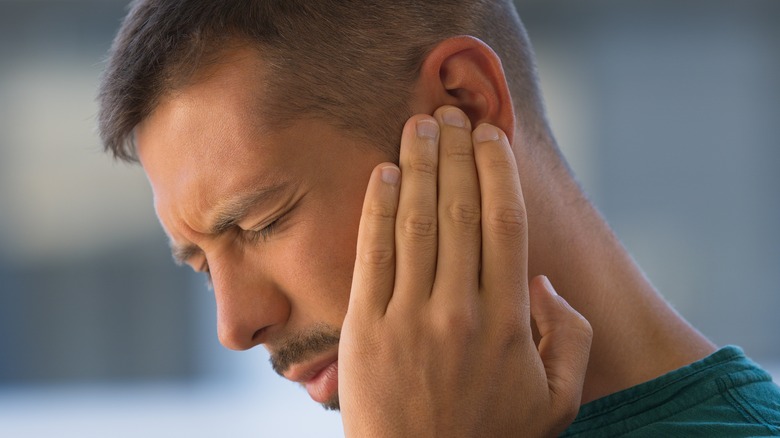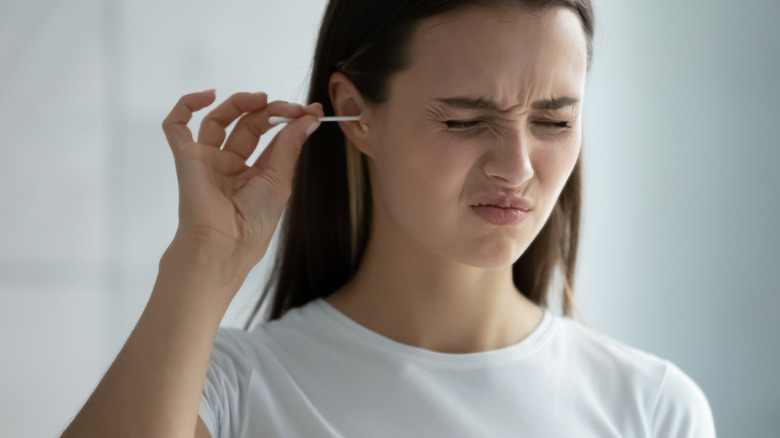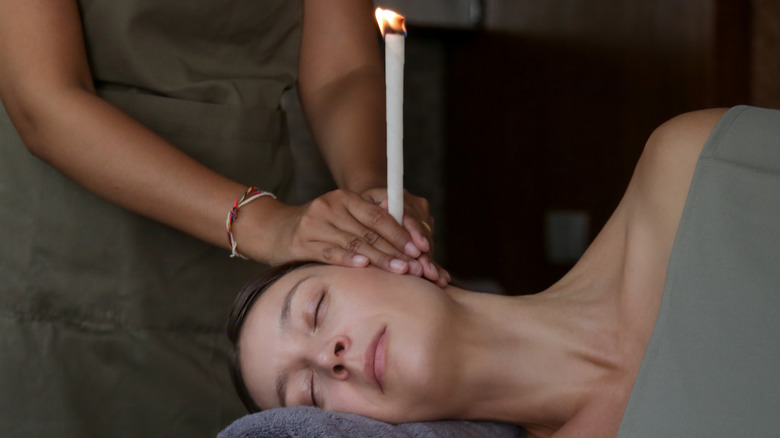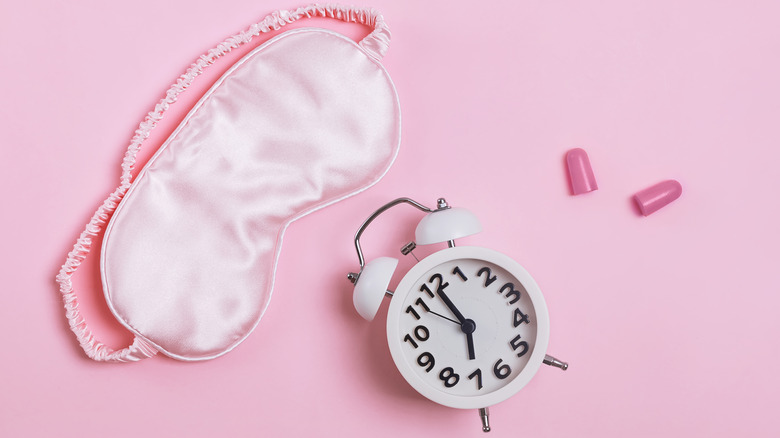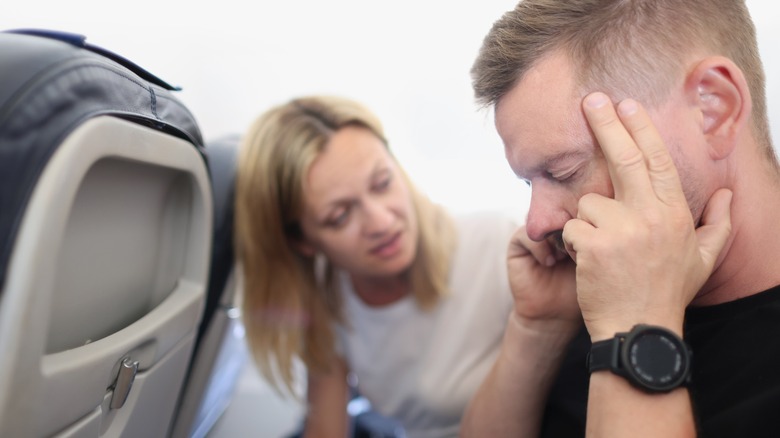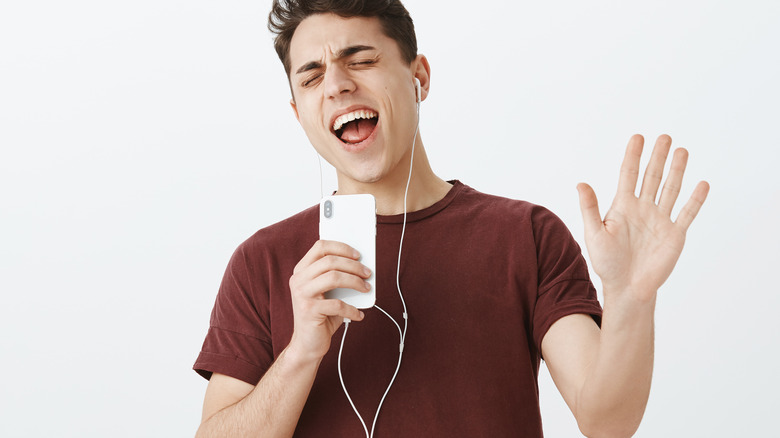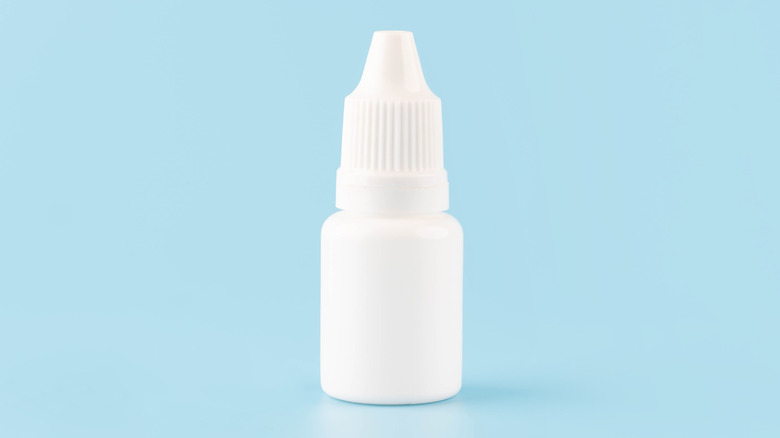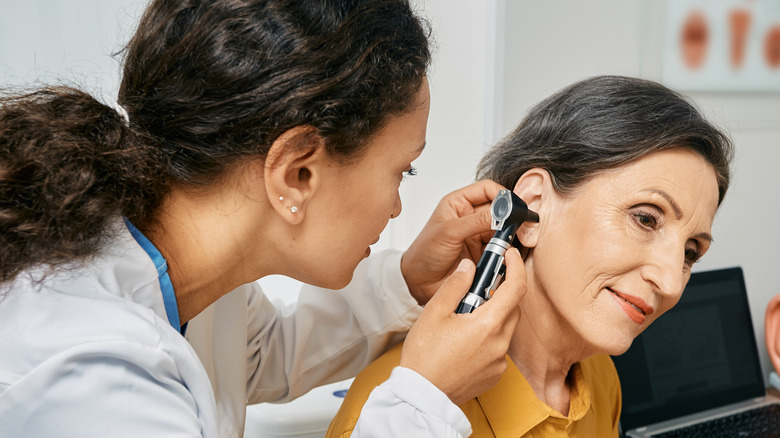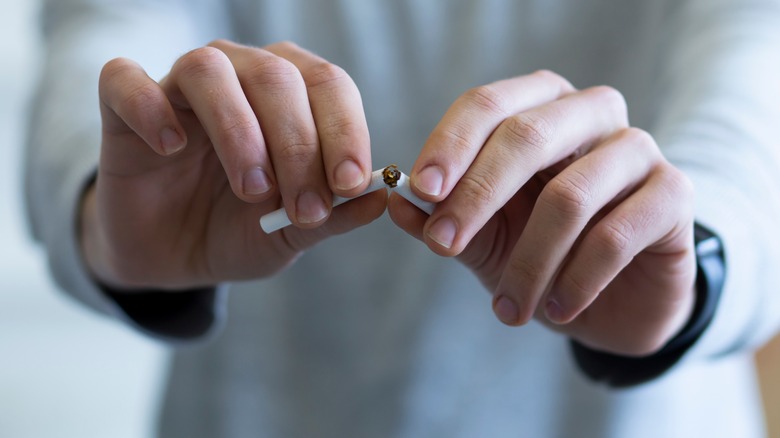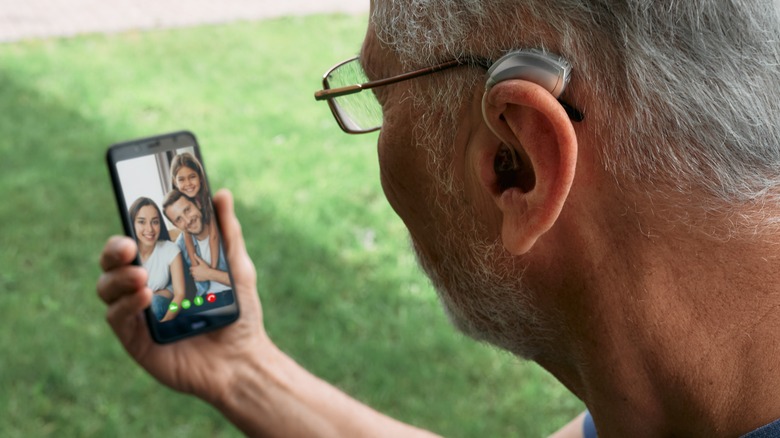Mistakes You Didn't Realize You Are Making With Your Ears
Take a second, and stop what you're doing. Focus not on the screen you're reading this on, but on what you can hear. Maybe it's the sound of the street outside, the chirping of the birds, or the hum of the refrigerator that you've never noticed before — a symphony of everyday sounds. Pretty amazing, huh?
Hearing is so ingrained into people's existence that most of us take it for granted, but we really shouldn't. Our sense of hearing gives us the ability to receive information about the world around us, protect ourselves from harm, and communicate with others, states Hearing Link Services. Yet, like our other senses, our hearing can get worse, and sometimes disappear entirely. And hearing loss is a concern no matter what age you are, with roughly 15% of all adults in the United States having some degree of hearing difficulty, and half of all adults over 75 experiencing hearing loss to a disabling degree (per the National Institute on Deafness and Other Communication Disorders).
And it all starts with the ears. Keeping your ears healthy and well tended to is vital to keeping your sense of hearing in top form. But what might surprise you is how easy it is to make mistakes that could compromise your ear health or hearing ability. We've got a list of those top mistakes right here.
Using cotton swabs to clean them
If you have a pack of cotton swabs in your medicine cabinet, there's a pretty good likelihood you bought them to clean your ears. But while this is a common practice that could be harmless for the cleanliness of your outer ear, using them to tackle your inner ear may cause problems, as Healthline states.
When you shove a cotton swab into your ear canal to remove earwax, you may end up just pushing the wax further down, warns ontologist Yu-Tung Wong (via Cedars Sinai). Not only can this contribute to a wax build-up, but it also means that it's harder to get the wax out, somewhat working against what you originally intended.
Additionally, poking a thin object around in your ear is a recipe for disaster when it comes to ear injuries, explains Wong, and doing so may lead to ear damage, perforation of the ear drum, and potential hearing loss. Even if you're only intending to clean the outside of your ear with a swab, Wong urges caution, as just one small slip can lead to the bud pushing into your ear and causing trauma. If you're concerned about how to clean your ears correctly, it may be worth speaking with your doctor about the best treatment for you.
Having ear candling treatments
Of all the treatments out there that claim to deal with earwax, ear candling has to be one of the strangest. Ear candling involves lying on one side, having a wax-covered cone placed inside your ear, and lighting the other end, which is said to cause a suction effect that pulls out earwax and anything else that's worked its way into your ear (per Healthline).
But while ear candling might seem like a novel way to get rid of earwax, it's pretty ineffective. There has yet to be any definitive proof that ear candling actually removes earwax. As a matter of fact, what may end up happening is that you get more wax in your ear than the amount you started with, thanks to the wax from the candle dripping into your ear canal, as one study published in the Iranian Journal of Otorhinolaryngology shows.
Furthermore, placing a narrow object into your ear and lighting the other end of it isn't exactly risk-free. Ear candling can raise the likelihood of significant ear injuries (including burns, thanks to the dripping wax) both to your ear and to the rest of your body.
Always sleeping with earplugs
We all like a restful night's sleep, and for some people, there's no better way to do that than to block out surrounding noise with earplugs. But doing so night after night may be doing your ears unexpected harm.
The problem with using earplugs every night is that you may be pushing earwax and other dirt and debris further into your ear when you go to bed, explains Boots Hearingcare. This can lead to a host of issues, ranging from everything from increased itchiness to a higher likelihood of ear infection or hearing damage.
This can be exacerbated if you don't take good care of your earplugs and store them correctly, as during the day, they can collect dust and dirt, which you then end up putting into your ear at night. Not fun, huh? Remember, though, that earplugs are not unsafe objects for your ears — you just need to make sure you're using them correctly. Only insert your earplugs with recently washed, dry hands, ensuring that there's no dirt or earwax buildup on them. Roll them between thumb and finger until they're thin enough to push into your ear, and then do so gently, making sure you don't insert them too deeply.
Traveling with an ear infection
Most of us have been in a situation where we've had to press on with our lives despite having an illness. But if you're experiencing an ear infection, it could be wise to hold off on certain activities like flying.
Although flying causes changes to your ears, this is normally temporary, with the cabin pressure causing a tell-tale "popping" in the ears that goes back to normal when you land (via the Harley Street Ear Nose & Throat Clinic). When you have an ear infection, however, the Eustachian tube, which releases air to the outside world from your ears to balance things out, may become compromised or affected by inflammation. This can not only cause discomfort and an inability to balance your ear pressure; in more serious cases, it may even result in a burst eardrum. Flying with an ear infection may also lead to permanent ear damage and hearing loss.
Delaying travel plans is doubly important if you're traveling with a child who's experiencing an ear infection, as their Eustachian tubes are less developed, putting them at greater risk of ear problems or damage.
Allowing tinnitus to make you more stressed
For a lot of people, what they hear aren't just the noises of the outside world. Up to one in five individuals also experience persistent or periodic ringing or buzzing in their ears with no apparent outside source, a condition known as tinnitus (per the Mayo Clinic).
While tinnitus can often be mild and not get in the way of a person's day-to-day experience, for some folks, the condition can cause anxiety and stress. Unfortunately, though, this stress can create even more problems. There's a clear link between stress and tinnitus, with the state heightening the symptoms of the ear condition or causing an onset of ringing or other noise, explains the Royal National Institute for Deaf People (RNID). This means that if your tinnitus is making you feel irritated or stressed, you may be aggravating the problem.
While discussing the issue with an audiologist or your doctor is a good course of action, it's also advisable to do what you can to reduce stress. Practicing meditation or listening to relaxing music can assist in bringing stress levels down, as can avoiding stimulants like caffeine, alcohol, or nicotine.
Setting the volume on your earbuds too high
Sometimes, you just have to rock out to your own personal earbud party. We get it. But if you're always hitting "ignore" on that loud volume warning on your phone, it's probably time to pay it a little more attention.
When we listen to loud music regularly, the hair cells in our cochlea, which allow us to discern sounds, become damaged, explains the CDC. This damage can occur on a massive scale before we even notice that we have a hearing impairment, and up to half of our cochlear hair cells can be destroyed before it starts to register consciously as hearing loss.
Young adults, teenagers, and children are at particular risk of sustaining hearing damage from listening to loud music through their earbuds regularly, as research published in The Journal of the Acoustic Society of America shows. Bear in mind that some earbuds are capable of reaching well above 100 decibels, which is far higher than what's safe for your hearing (via the Hearing Health Foundation). Ideally, you should try to keep your earbuds' volume at no higher than 60% of their maximum capacity. Doing so will keep your hearing safe for longer.
Not covering your ears while swimming
Swimming is one of the best ways to keep fit, with the activity providing both a cardiovascular and muscular workout, while also just making you feel good (per Healthline). But not every part of your body loves it when you jump into the pool, and your ears can be particularly susceptible to some nasty consequences.
When you enter a swimming pool without covering your ears, water naturally works its way into your ear canal, explains the CDC. If that water stays in the outer ear canal for too long, the damp environment provides the ideal place for bacteria to thrive and cause infection, a condition known as swimmer's ear.
Swimmer's ear isn't contagious, but it can be pretty irritating, causing swelling, pain, and itching inside your ears. The best thing to do is to try and keep your ears covered when you're taking a dip. Earplugs and swimming caps are a great way to limit the amount of water entering your ear canal.
Once you're out of the pool, it's also important to dry your ears off quickly, so that bacteria don't have a chance to grow. If water has worked its way into the ear canal, try tilting your head from side to side. This will allow gravity to do its work, letting the water leak out of your ear.
Not giving your ears time to rest
Our ears are constantly working to detect sound, and boy, do we put them through their paces. But exposing the ears to especially loud sounds can cause them a little too much stress, as anyone who's ever noticed that their hearing is temporarily impaired after being in a loud nightclub or event can attest to (via Bloom Hearing Specialists). And if this happens to you, you must give your ears a little rest and relaxation.
By seeking out quiet environments after exposing your ears to loud noises for a while, you give them crucial recovery time and avoid any additional damage that might occur. It can also be a good idea to protect your ears in other ways following loud noise exposure, like keeping away from substances like alcohol, which can cause your ears to take longer to go back to normal due to heightened blood flow to them. The best thing you can do for your ears, though, is to avoid exposing them to loud noises as much as possible, in order to maintain the health of the delicate hairs in the inner ear.
Forgetting to deal with your earwax
Look, no one said that earwax is fun to tackle, but the fact of the matter is, we've gotta do it. Earwax is produced in our outer ears and works to keep our ears clean and prevent foreign bodies like germs and bacteria from causing infection (per Boots Hearingcare).
But although it normally travels from the ear canal to the ear opening without a hitch, earwax can be susceptible to building up, says NHS Inform. This can result in a wide range of hearing issues, with a build-up of earwax causing hearing loss, tinnitus, pain in the ear, and an increased likelihood of ear infections. That's why it's important to assess your earwax periodically, and remove any excess wax before it has the chance to block your ears. The best way to do this is by using specially-designed drops that work to make your earwax softer, which then allows it to leak out of your ears gently.
As much as possible, though, avoid using objects inserted into your ears to try and dislodge the wax — even using your finger can push the earwax further in, subsequently contributing to a blockage.
Skipping your hearing test
Most of the time, we don't even notice our hearing consciously, unless there's a significant change. For this reason, it can be easy to shunt your hearing test appointments to the bottom of the priority list. But trust us when we tell you that skipping a hearing test is one of the worst things you can do for your ears.
Hearing tests are vital to flag the early signs of hearing damage and loss, which may go unnoticed in your everyday life (via Hoffmann Audiology). These tests can also help determine any sources of hearing loss, and whether they're due to an underlying condition or environmental factors. Plus, hearing tests aren't just important for your sense of sound: They can also be instrumental in identifying other ear-related conditions, such as Meniere's disease.
The good news is that for the majority of your life, you won't need to get your hearing checked that often, unless you're concerned about hearing loss. A test every ten years should be sufficient for most adults, with people over 60 advised to have a hearing test once per year, says Regain Hearing.
Not protecting your hearing at live events
If you like to fill your calendar with new experiences, sooner or later, you're likely to end up somewhere pretty loud. But while live events full of noise may be exciting and fun, they can also be damaging to your hearing.
Noise-induced hearing loss (also known as NHIL) can become more likely when you're attending loud events where the noise levels go above 85 decibels, explains Keck Medicine of USC. And while certain events like live music or sports games may be obvious culprits for this, others may surprise you. Simply going to the movies, for example, may put you in an environment where noise levels go above 100 decibels, and this sustained volume may contribute to NHIL. Also, if you're a motorcyclist, certain bike models can be incredibly loud. Most potentially damaging of all, however, are fireworks displays, which can reach an astounding 160 decibels.
While it may not be the most fashionable thing in the world, a pair of ear protectors could be your best friend at events like these. Alternatively, simply put in a pair of earplugs. It's also vital to protect the ears of any kids you take with you.
Smoking
It can be tempting to treat your hearing as a separate entity from the rest of your body, but it can be influenced by certain habits that interact with other parts of your system. One of these is smoking.
Aside from the various well-known detrimental health impacts of smoking, it can also have a significant effect on your hearing, according to a study published in the Journal of Clinical & Diagnostic Research. Researchers found that the more people smoked, the more they were likely to experience sensorineural hearing loss, which occurs due to damage to the nerve endings in the inner ear (per MedlinePlus).
It should be noted that this study was relatively small, with just under 150 participants, so further study is likely needed. Nonetheless, the researchers did state that this study pointed toward the usefulness of monitoring hearing in smokers more closely, and in medical treatments and interventions which could tackle it sooner rather than later. And given that smoking can also contribute to a higher risk of everything from lung disease to type 2 diabetes (via Medical News Today), it's definitely a good idea to quit.
Putting off getting a hearing aid
If you're experiencing some degree of hearing loss, having a hearing aid fitted may be necessary. And if you need one, it's advisable to get your aid as soon as possible.
Having a hearing aid when you have hearing loss can improve your quality of life and make communication with friends, family, and colleagues easier, advises Your Hearing Network. Hearing aids also contribute to the maintenance of your overall brain health, as the increased hearing that the aid provides keeps your hearing nerve stimulated and healthy. Having a hearing aid can also prevent feelings of isolation and low energy that may occur if you feel that you're missing out on hearing-based interactions.
With that said, it's worth remembering that your hearing won't necessarily deteriorate any faster if you don't have a hearing aid fitted — but as holding off on getting one can prevent your general ability to communicate, it's worth doing sooner rather than later.
Is it possible to reverse hearing loss?
Not all hearing loss is created equal, and it can occur due to several different causes. Sensorineural hearing loss (which happens thanks to damage to the inner ear or auditory nerve) is the most frequently experienced type, whereas conductive hearing loss is usually prompted by a blockage in (or damage to) the middle or outer ear (per Healthline). Hearing loss can also be a mix of the two.
The type of hearing loss you have will determine whether it's reversible or not, and the unfortunate news is that for all types, hearing damage can be permanent. In the case of sensorineural hearing loss, the damage to the body is irreversible, but you may be able to gain some hearing capacity through hearing aids or cochlear implantation. Conductive hearing loss, on the other hand, can be reversed to varying degrees, and in the case of loss caused by blockages, the hearing may be able to be entirely regained. In other situations, such as hearing loss caused by the anatomy of your ear itself, it may be harder to reverse.

